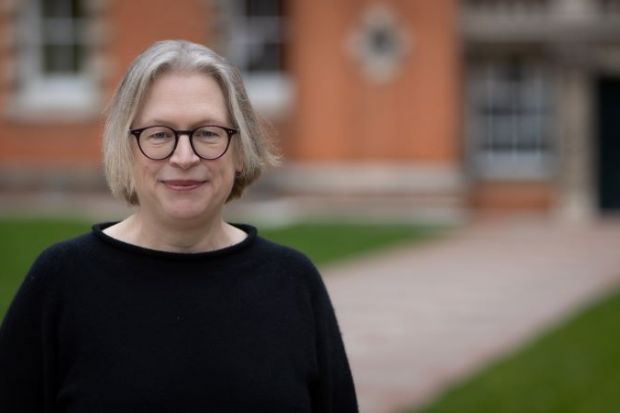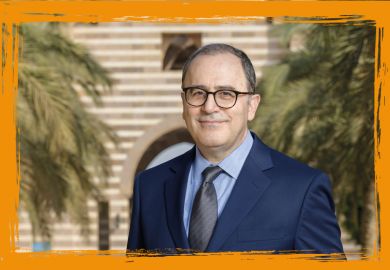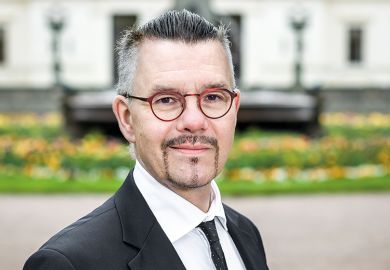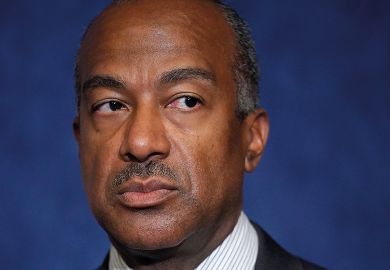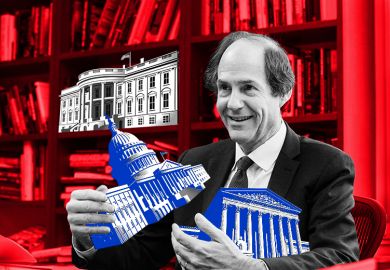Julie Sanders, a first-time vice-chancellor, doesn’t want to do it all alone. One year into her leadership of Surrey-based Royal Holloway, University of London, she reflects: “Everyone says these are lonely jobs, and they can be. But you also have to stop making them lonely.”
For Sanders, the isolation of the vice-chancellor role diminishes with teamwork. “I’m a great believer in finding your teams,” she says.
Since April, she has made several key appointments to the senior leadership team, hiring two new pro-vice-chancellors on the academic side, as well as two executive directors in professional services. In this way, she hopes to maintain “parity of esteem” between academic and professional leadership roles.
Under Sanders, the university has also launched a new cohort of associate pro-vice-chancellors – in areas such as research and innovation and postgraduate research – who maintain these positions alongside their core roles, which include professorships or executive deans of departments.
The vice-chancellor says it has been important to her to “pull through the talent across the organisation” and to give more staff a pathway to a broader leadership team.
“We’re working really hard with all the heads of professional services and our heads of departments to say, ‘you are all part of Royal Holloway’s leadership’.” In practice, she explains, this means sharing information early, asking for input early and making people feel that they are involved in processes, rather than finding out about big decisions after they have been made.
Sanders, who was previously deputy vice-chancellor and provost at Newcastle University, says that one of the things that attracted her to the top job at Royal Holloway was the possibility of building teams to make education more inclusive.
Over the past few years, the leafy campus on the edge of London has become much more diverse; 51 per cent of students were from black, Asian and minority ethnic groups in the last academic year, up from 42 per cent in 2018-19. Since joining, Sanders has brought together a group to think about how to write a new strategy to serve the needs of students and steer the campus towards change.
She is persuaded by the model of “distributed leadership” – an approach she describes as “encouraging teams to feel empowered to have agency in creating the future”.
This first year of her tenure, she says, has effectively been a “listening campaign” across the organisation, through conversations, workshops and leadership events. Hearing from students and colleagues has impressed on Sanders the belief that everyone wants to be involved and that there is a real hunger to come together.
In illustrating this, Sanders reflects on the after-effects of the pandemic. She recalls the period of sitting isolated in rooms, staring at screens.
“You’d get up from your desk and you’d feel a bit dizzy, a bit of vertigo, because we’d stopped looking at the long horizon.”
She relays hearing of the challenges since – of tiredness, working long shifts and the adjustment to being on a fully in-person campus again.
Yet she has gleaned that both staff and students are yearning to collaborate. Her job, she says, is to help the community to do that, as well as get excited about the long horizon again. In other words, sharpening the blurriness and focusing on the big picture anew.
“Everybody I know in university is here because they have a sense of purpose and want to be here because higher education matters. And they want to make a contribution. If you share the information, and you share the rationale along the way – the difficult stuff, as well as the glossy, exciting stuff – then I hope that really will take us a long way towards being a true community,” she says.
The thrill that Sanders feels in the “coordination and choreography of bringing people together to do amazing stuff” has been nurtured by different influences.
In one of her early leadership roles, between 2013 and 2015, she was vice-provost for teaching and learning at the University of Nottingham’s campus in Ningbo, China. It was during this time that she also helped to set up and launch the Arts and Humanities Research Council’s first research centre in China, on digital copyright.
In the south of Shanghai, she says, she worked with policymakers, creatives, a number of UK universities, the Chinese government and other local industry partners, as well as students. Sanders, with her PhD in English and European Renaissance Drama, remembers being limited by her Mandarin, which was only good enough for “conversations with six-year-olds”.
“It’s an amazing thing to decentre yourself; to realise you are a very small cog in a very big world,” she says, of her time navigating China.
She adds that her time abroad – first in Venice and Berkeley as a study-abroad student, and later in China as an administrator – has changed how she thinks about global strategy and about being an international student.
“I’m really mindful of not assuming that that [international students] is one monolithic group. I think you have to think about all of the complexities and nuances,” she says.
Now in the Surrey institution, Sanders likes to think of universities as institutions with “porous edges”, sitting within the communities in which they are located. She’s not taken by the strategy of universities delivering messages or impact, but rather in paying attention to community needs and building teams to help with that.
Among the local opportunities for Royal Holloway is the film and television industry, with Pinewood Studios, Longcross Studios, Shepperton Studios and the National Film and Television School all a short drive away.
Most recently, Royal Holloway was named as the lead partner for a national CoSTAR (Convergent Screen Technologies and Performance in Realtime) lab, which involves a £51 million investment from the UK government towards research and development in screen and performance technology. It brings together university researchers, the creative industry and advanced computing, led by a national agenda.
In line with her vision for teams, Sanders has appointed new associate pro-vice-chancellors to lead on creative industries and on partnerships and external collaboration, to help drive the work for the skills agenda nationally but also to support students and staff.
Sanders is especially well placed in this creative corner that sits outside London, with her background in the research of early modern drama and her continued work in the industry. She is a trustee of three major cultural venues, including Shakespeare’s Globe in London, which she believes “feeds her knowledge” of partnership working and inspires her to create a “values-led institution in complex commercial settings”.
While her first year wraps up with a clear sense of vision for the Royal Holloway community, Sanders says it was still the “most challenging” period of her career. With the after-effects of the pandemic, the cost-of-living crisis and industrial action, she admits that the year has been “incredibly painful”. She is still grappling with “the fissures and fractures that undoubtedly happen in times of industrial actions”.
Every day, Sanders says, she “touches” history as she works from the offices of what were two 19th-century women’s colleges before Royal Holloway was formed. While she is inspired by this founding story, she also feels a responsibility to take the institution forward and prepare it for the future.
Sanders also reflects on the beginning of her own story, where she was one of only two students in her year at high school in Chingford, east London, who made it to university – the other being the BBC’s Russia editor Steve Rosenberg. “I have that very typical story of some inspirational teachers who put the time in to sort of build my confidence that university was possible for me,” she recalls.
“If you told my 16-year-old self that I’d have the opportunity to be part of the leadership of universities in the UK, I wouldn’t have believed it possible,” she says. “I’m not high on ceremonial. I’m not a big hierarchy person. I’m trying to do it…and still stay me.”
tiya.alexander@timeshighereducation.com
This is part of our “Talking leadership” series with the people running the world’s top universities about how they solve common strategic issues and implement change. Follow the series here.
Register to continue
Why register?
- Registration is free and only takes a moment
- Once registered, you can read 3 articles a month
- Sign up for our newsletter
Subscribe
Or subscribe for unlimited access to:
- Unlimited access to news, views, insights & reviews
- Digital editions
- Digital access to THE’s university and college rankings analysis
Already registered or a current subscriber?
